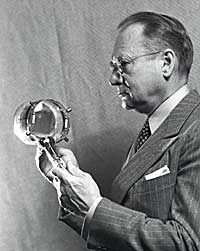Vladimir Zworykin
- Birthdate
- 1889/07/29
- Birthplace
- Russia
- Death date
- 1982/07/29
- Associated organizations
- RCA (Radio Corporation of America)
- Fields of study
- Television
- Awards
- IRE Medal of Honor, AIEE Edison Medal
Biography
By the 1970s, the oft-called Father of Television Vladimir Zworykin parked his 21-inch RCA TV in the corner of a room and rarely turned it on. He was not fond of the shows. But without him, we would not have TV as we know it today. In 1924, he created the iconoscope, the first practical, all-electronic television camera tube. In 1929 he invented an important part of the receiver called the kinescope, a cathode-ray picture tube. Zworykin’s work moved television away from mechanical systems and his contributions to electronic television are immense.
Zworykin was born in Russia on 30 July 1889. He was interested in television his entire career. As a young engineering student, he worked for physicist Boris Rosing who was trying to send pictures through the air. In 1919, following the Russian Revolution, Zworykin moved to the United States. He worked at Westinghouse Electric Corporation in Pittsburgh. In 1929, when Zworykin didn’t get the support or encouragement he needed to build electronic televisions, he moved to RCA. With the strong support of RCA’s head David Sarnoff, another Russian immigrant, Zworykin continued developing electronic television. His all-electronic television system was introduced to the public at the 1939 New York World’s Fair.
Zworykin’s and RCA’s work was directly challenged by the patent claims of Philo T. Farnsworth who also worked on electronic television. Farsworth won a major patent suit against RCA in 1939 and Zworykin’s designs for electronic TV would not be considered the first. Despite the legal battle, Zworykin’s contributions to televison were great. And while some may have called him Father of Television, Zworykin always said that television was the creation of hundreds of inventors and researchers. Zworykin's own contributions were recognized by the AIEE who awarded Zworykin its Edison Medal in 1952 'For outstanding contributions to concept and design of electronic components and systems.' In 1950 he was awarded the prestigious Medal of Honor by the Institute of Radio Engineers (IRE) "For his outstanding contributions to the concept and development of electronic apparatus basic to modern television, and his scientific achievements that led to fundamental advances in the application of electronics to communications, to industry and to national security." He died on 29 July 1982 in Princeton, New Jersey.
Further Reading
Vladimir Zworykin Oral History
